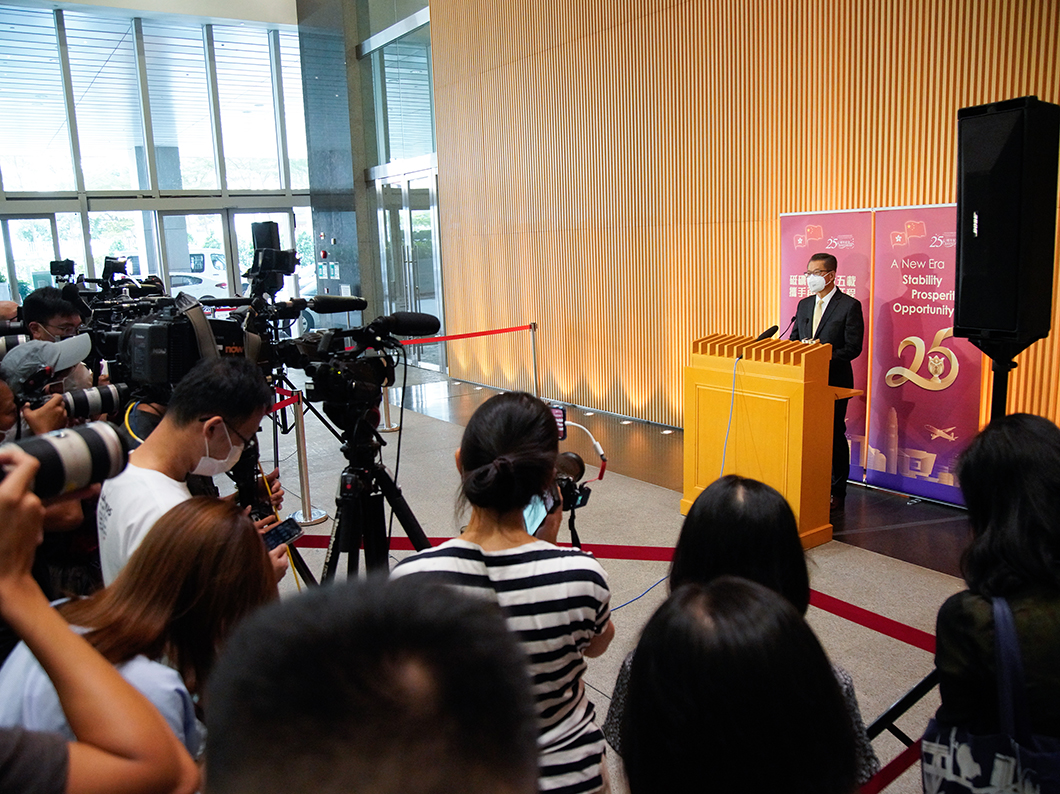Blog
Short-term economic outlook amid rising interest rates
The US Federal Reserve Board (Fed) raised interest rates by 75 basis points last Monday in line with market expectations. Such a sharp increase in interest rates took place two times in a row in two months’ time. The Federal Funds Rate has now risen to 2.25 to 2.5%. The annual inflation rate in the US rose to a new 41-year high of over 9% in June, and has propelled the Fed to raise interest rates four times by a total of 225 basis points this year. The Fed has indicated that at this stage, interest rate hikes would still be appropriate, and would determine the way forward according to economic data.

|
| I attended a media session on the US Fed rate hike last week. |
The US has repeatedly raised interest rates sharply and reduced its balance sheet to curb inflation, but how it could avoid a recession at the same time has become the market focus. In particular, the US GDP contracted by 1.6% on an annualised quarter-to-quarter basis in the first quarter, and then by 0.9% in the second quarter, recording the second consecutive quarter of negative growth. The inverted yield curve of long- and short-term bonds also reflected market concerns about the possibility of a recession in the US.
In Europe, the conflict between Russia and Ukraine has led to elevated energy and food prices, and the threat of inflation in the region is even more severe. Earlier, the European Central Bank raised interest rates by 50 basis points for the first time since 2011, raising concerns about the economic outlook. Lately, the International Monetary Fund has further lowered its global economic growth forecasts for this year and next year, to 3.2% and 2.9% respectively, and warned that the risk of a global recession has increased.
The notable deterioration of the global economy has also affected Hong Kong’s economic performance. While the second quarter GDP figures released showed some improvements on a quarter-to-quarter basis, there was a contraction year-on-year, though by a narrower rate of decline than in the first quarter. The situation is hardly ideal. Considering the latest global and local economic developments, when we review Hong Kong’s full year economic forecast in the middle of August, it is inevitable that it will have to be revised downward once again.
When reviewing Hong Kong’s economic forecast, we take into account the latest developments in the “three locomotives” that drive our economy - namely exports, consumption and investment. Regarding exports, as the central banks in the US and Europe raised interest rates one after another and their economic growth has weakened, Hong Kong’s export performance would be dragged. In fact, as announced just last week, the value of Hong Kong’s total exports fell by 6.4% year-on-year in June, with exports to the US and EU having declined, reflecting the impact of the economic downturn in those places on Hong Kong’s exports.
On consumption, amid the sharp increase in interest rates in the US, Hong Kong’s interest rates are under upward pressure, which will affect asset prices such as those for Hong Kong stocks and properties, and dampen our residents’ willingness to spend. The second phase of consumption vouchers will be disbursed in batches soon. It is expected to boost local consumption. From last year’s experience, it can be seen that if the epidemic was stable and under control, and with the effect of the consumption vouchers, the retail and dining businesses could see significant improvements. Meanwhile, I also saw for myself the considerable number of visitors and amount of spending in large-scale exhibitions and conventions like the Hong Kong Book Fair and the Ani-Com & Games Expo.

|
| Yesterday I took a tour at the Ani-Com & Games Expo to learn more about our local young people’s creative work, as well as the business situation of this year exhibitors. |
On fixed investment, the overall weakened economic outlook, coupled with prospective rising interest rates, would increase borrowing costs and put pressure on business operations, bringing about a negative impact on overall investments.
As we face the short- to medium-term economic pressure, we will closely monitor the situation, make prudent judgments and adjust our policies to cope with changes in a timely manner. Taking anti-epidemic work as an example, the government of this term has adopted disease prevention and control measures under the principles of being science-based, evidence-based and precise, and reviewed the effectiveness of the existing measures and operational experience with a view to making appropriate adjustments to achieve the greatest effect with the lowest cost, thereby minimising the impact on normal social activities and visitors.
We are currently pushing ahead with the preparatory work for the Global Financial Leaders’ Investment Summit, which is scheduled to be held in November, and the financial industry is brimming with excitement for the event. Along with the Hong Kong Sevens to be held in the same month, these physical events will symbolise our reconnection with the world ever since Hong Kong was struck by the pandemic more than two years ago. These events will revitalise Hong Kong’ connection with the international community and highlight our status as an international financial centre.
Changes in the macro investment environment will not stop us from taking things forward. For instance, the issuance size of the forthcoming seventh batch of Silver Bonds will substantially increase to a maximum of $45 billion, much higher than the minimum size of $35 billion as announced in the Budget earlier this year. The minimum interest rate will also increase to 4%, which is higher than that of the sixth batch at 3.5% last year. Relevant details will be announced by the Hong Kong Monetary Authority shortly. In short, though our economy is facing uncertainties, I have full confidence in Hong Kong’s future. Looking ahead, there are more opportunities than challenges. As President Xi mentioned in his important speech during the ceremony on the 1st of July, “One Country, Two Systems” will be adhered to in the long run, and we must maintain Hong Kong’s distinctive status and edges. The Central Government fully supports Hong Kong to improve our presence as an international financial centre. All these have laid the foundation of our confidence in Hong Kong’s future.
The role of Hong Kong as an international centre of our country will definitely become more important in the future. The development pattern and directions of our country and the world will also guide ours. Our country is progressing towards higher quality development and entering a new era of broader and deeper opening up. As long as we actively dovetail ourselves with national development strategies, Hong Kong’s social and economic development will break new ground and achieve another leap forward.
July 31, 2022